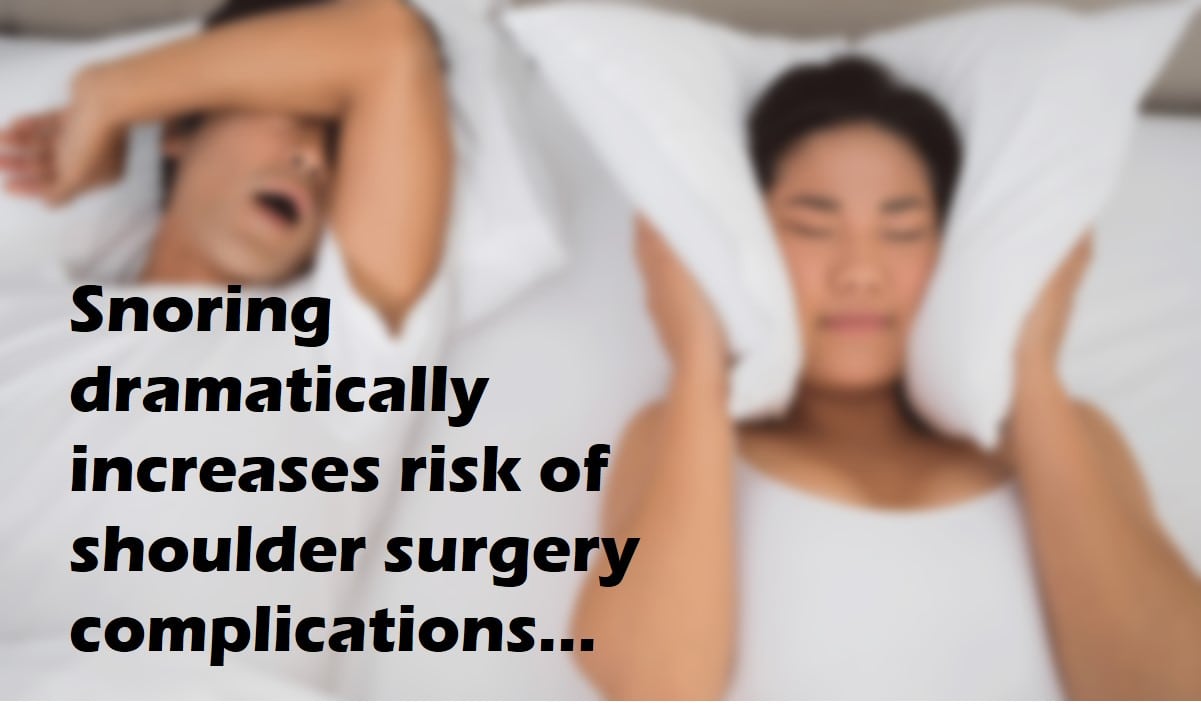Snoring Can Hugely Increase Your Risk of Complications After Shoulder Surgery

We have an epidemic of sleep apnea in the industrialized world. But what most patients probably don't realize is that it can lead to not only lots of adverse health events like heart attack and stroke, but that it can also increase surgery risk. This morning's study is on how patients who snore (have apnea) are more likely to have complications with common shoulder surgery.
Defining Shoulder Arthroscopy
Shoulder arthroscopy, as with other arthroscopy surgeries, is a procedure that is often recommended as a less invasive alternative to open surgery. Arthroscopy involves making an incision through the skin and tissues all the way into the shoulder joint and passing a scope (a small camera instrument) through the opening and into the joint to visualize the site. Additional tunneling incisions (i.e., portals) are also made that are large enough to pass surgical instruments into the joint. From here, the damaged shoulder structures are cut, stitched, replaced…depending on the surgery being performed. Unfortunately, whether it’s a hip arthroscopy, a knee arthroscopy, or a shoulder arthroscopy, these surgeries also come with many potential problems.
Common conditions that are often treated with shoulder arthroscopy surgery include shoulder impingement, shoulder labrum tears, and rotator cuff tears.
What Is Sleep Apnea?
If you or your partner snore, you have some degree of sleep apnea. Sleep apnea is a disruption in respiration, or breathing, while sleeping. In obstructive sleep apnea, which is the most common type associated with snoring, the muscles in the throat over-relax and block the airway. One telltale sign of obstructive sleep apnea is snoring. Another kind of sleep apnea is rarer and is called central sleep apnea. Respiration actually stops as the brain neglects to communicate with the muscles responsible for breathing; however, snoring isn’t typical in central sleep apnea.
Sleep apnea can indirectly lead to a variety of conditions and disorders. For example, sleep apnea can cause insomnia, which has recently been associated with chronic muscle pain. Another interesting sleep apnea finding is a disruption in Leptin levels, a hormone that helps control appetite; however, too much of this inflammatory hormone has been associated with knee arthritis. Finally, snoring associated with obstructive sleep apnea may cause a decrease in bone marrow stem cells as the stem cells are mobilized out of the bone marrow to help reduce the chronic body inflammation caused by the sleep apnea. Chronic inflammation is associated with a whole host of diseases, such as strokes, arthritis, cancer, and so on.
Sleep Apnea Patients More Likely to Suffer Heart and Lung Complications After Shoulder Arthroscopy
The purpose of the new study, a large cohort of shoulder arthroscopy patients from 583 hospitals, was to investigate disease and mortality outcomes in patients with sleep apnea who underwent outpatient shoulder arthroscopy. Researchers found a nearly 5 times greater chance of heart attack (4.95X greater) and pulmonary complications (4.92X greater) after shoulder arthroscopy in patients with sleep apnea when compared to those without. In addition, sleep apnea patients were more likely to be admitted to inpatient hospitalization or the ICU and to require mechanical ventilation after shoulder arthroscopy.
More Issues with Shoulder Arthroscopy
Do common shoulder surgeries work?
- Shoulder arthroscopy for labrum tear surgery has been shown to be no better than a placebo, or sham, surgery.
- One study found a 79% retear rate in patients who underwent arthroscopic shoulder surgery for large rotator cuff tears.
- Biceps tenodesis is another surgery that can be done via shoulder arthroscopy surgery. It attempts to correct a labrum tear by cutting the biceps tendon from labrum and repositioning and reattaching it further down the arm bone. Biceps tenodesis is on my running list of dumbest surgeries as research also shows it is no better than fake surgery.
The upshot? It's scary to think that something as simple as snoring can place you at a 5X increased risk for serious complications following shoulder surgery. So if you snore, you may consider less invasive and newer ways to help your shoulder pain using interventional rather than surgical orthopedics.

If you have questions or comments about this blog post, please email us at [email protected]
NOTE: This blog post provides general information to help the reader better understand regenerative medicine, musculoskeletal health, and related subjects. All content provided in this blog, website, or any linked materials, including text, graphics, images, patient profiles, outcomes, and information, are not intended and should not be considered or used as a substitute for medical advice, diagnosis, or treatment. Please always consult with a professional and certified healthcare provider to discuss if a treatment is right for you.
